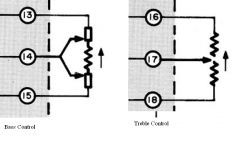The way the Bass Control on the PAT-4 is drawn mystifies me. What special thing are they trying to denote with the way it is drawn? The treble pot is drawn in the standard way, but look at the double arrows on the bass pot...
What are they trying to say?
What are they trying to say?
Attachments
They're ganged/split controls on a single shaft, and the treble control should be drawn the same as the bass.
mystery solved...
I cleaned the control with some contact cleaner to get it working, then I took it out and measured the resistances as a function of shaft position...what they're trying to show is kind of what it does, but not exactly. I've sketched out the characteristic, but have to think about it a bit more to make it nice enough to throw into simulation...
I cleaned the control with some contact cleaner to get it working, then I took it out and measured the resistances as a function of shaft position...what they're trying to show is kind of what it does, but not exactly. I've sketched out the characteristic, but have to think about it a bit more to make it nice enough to throw into simulation...
The PAT-4 Treble Control
The treble control is also a unique thing...here's a link to an analysis, plus a procedure for centering the control.
The PAT-4 Pages
The treble control is also a unique thing...here's a link to an analysis, plus a procedure for centering the control.
The PAT-4 Pages
There was a few companies that used this design which included Dynaco, some of the old Pioneers, Sansui , Kenwood and Sony to name a few. What they did was that the bass control was constructed from four half track potentiometers. Essentially when the control is set dead center the potentiometers are really disconnected from the circuit and essentially a tone defeat is realized in the same control. (which was a later switchable arrangement invention).
What you would find is that one pot only operates over half the entire span and the other pot operated only over the remainder of the span. This ensured a flat response at center position. It is simple to simulate once you get the hang of the methodology employed.
What you would find is that one pot only operates over half the entire span and the other pot operated only over the remainder of the span. This ensured a flat response at center position. It is simple to simulate once you get the hang of the methodology employed.
Nico...
Very interesting...I didn't realize it was so wide-spread. I was mostly used to seeing the Baxandall design proliferated. Do you know of a source for pots with these (now) unusual tapers?
Thanks...
Dan
Very interesting...I didn't realize it was so wide-spread. I was mostly used to seeing the Baxandall design proliferated. Do you know of a source for pots with these (now) unusual tapers?
Thanks...
Dan
Alps make them but I think they are specifically made for those amps. I know SONY used them about 15 years ago because I was equally intrigued and opened it to see what made them work as they did. The SONY had a center indent also. Maybe contact these guys technical division, someone may just feel sorry for you and give you one to "repair an amp"
Last edited:
- Status
- Not open for further replies.
- Home
- Amplifiers
- Solid State
- PAT-4 Bass Control
